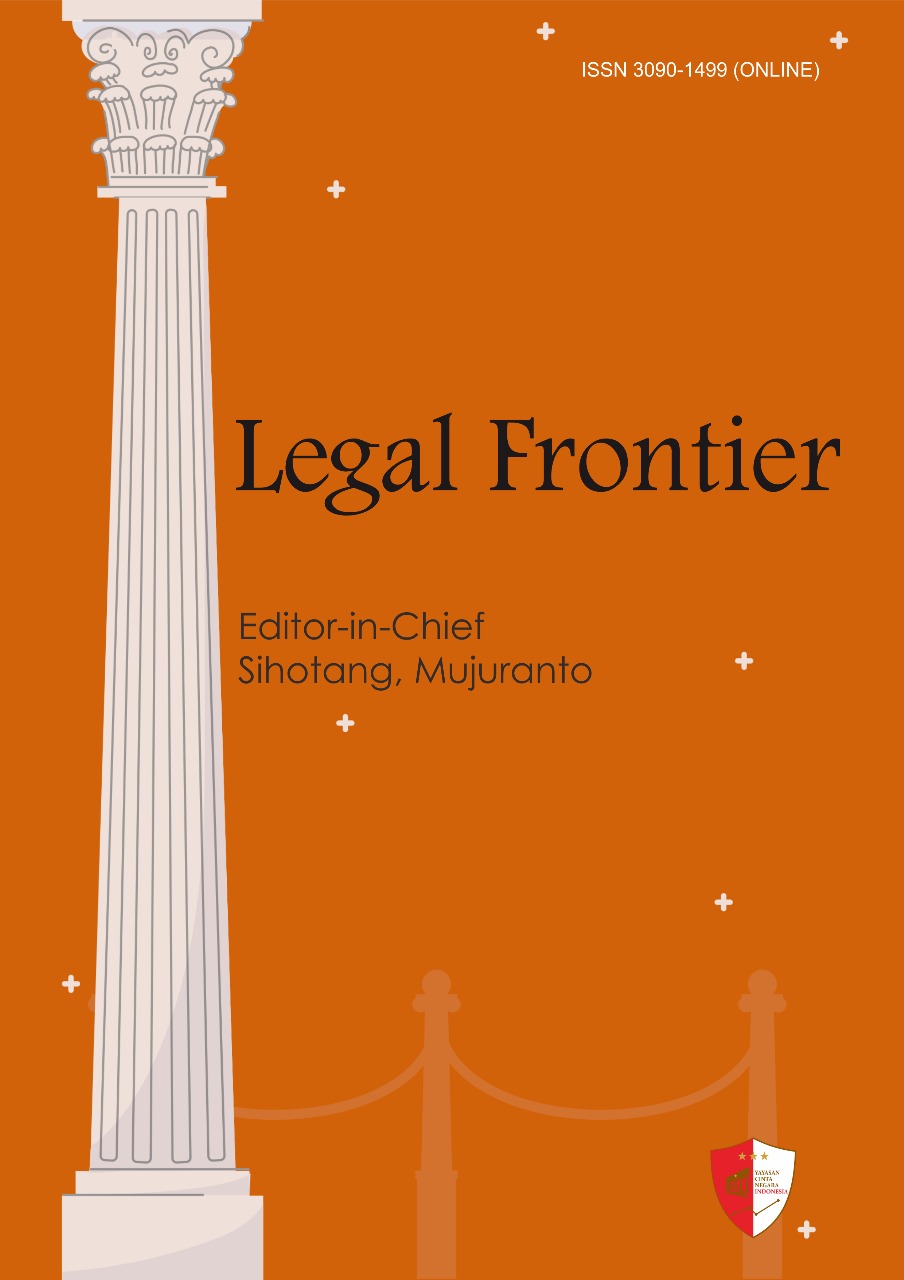A Legal Perspective on Inheritance of Joint Property: A Comparative Analysis of Various Legal Systems
Keywords:
Gender Justice, Inheritance Law, Inheritance Regulation, Joint Property Inheritance, Legal SystemAbstract
Joint property inheritance is a complex issue in various legal systems around the world, reflecting the different principles and approaches between Civil Law, Common Law, Islamic law, customary law, and hybrid legal systems. This research aims to comparatively analyze the legal perspectives on inheritance of joint property in various legal systems, highlighting the main principles, application in various countries, and regulatory challenges that arise. The method used is a systematic literature review, by analyzing legal documents, court decisions, and relevant academic studies. The results show that in Civil Law, the distribution of inheritance generally follows written legal rules that strictly regulate the rights of heirs, while in Common Law, testamenter freedom is dominant, although it can be corrected by the court. In Islamic law, the faraid system regulates the distribution of inheritance based on religious decree principles, while in customary law, cultural norms and community values often influence inheritance patterns. In countries with pluralistic legal systems, such as Indonesia, Malaysia and Nigeria, regulatory disharmony can lead to inheritance disputes, especially in terms of gender imbalance and jurisdictional conflicts between national, customary and religious laws. This research confirms the importance of regulatory harmonization to create a more inclusive and equitable inheritance law system. Legal reforms that accommodate gender equality, legal certainty and administrative efficiency are strategic steps in facing the challenges of inheriting joint property in the modern era. With a deeper understanding of these different legal systems, it is hoped that legal policies can be developed to reduce inheritance disputes and improve the protection of the rights of all parties involved.
References
Abdillah, R. M. I., Guspita, D. R., & Arief, E. R. (2024). The Complexity of Inheritance: A Comparative Analysis of the Distribution of Inheritance in Islamic Sharia and the Civil Code. International Journal of As Suadi: Law and Sharia Review, 1(1), 33–48.
Abubakari, Z., Richter, C., & Zevenbergen, J. (2019). Plural inheritance laws, practices and emergent types of property—Implications for updating the land register. Sustainability, 11(21), 6087.
Agarwal, B., Anthwal, P., & Mahesh, M. (2021). How many and which women own land in India? Inter-gender and intra-gender gaps. The Journal of Development Studies, 57(11), 1807–1829.
Ayitio, J. (2019). Hybrid land governance and the politics of institutional change in Ghana: Explaining divergent trajectories. University of Reading.
Betela, B., & Wolka, K. (2021). Evaluating soil erosion and factors determining farmers’ adoption and management of physical soil and water conservation measures in Bachire watershed, southwest Ethiopia. Environmental Challenges, 5, 100348.
Buțureanu-Cărpușor, A.-L. (2021). Testamentary Inheritance in Comparative Law. A comparative View of Testamentary Practices and Legal Frameworks in Italy and Latin America. Journal of Legal Studies “Vasile Goldiş,” 28(42), 124–141.
Chang, Y., Garoupa, N., & Wells, M. T. (2021). Drawing the legal family tree: An empirical comparative study of 170 dimensions of property law in 129 jurisdictions. Journal of Legal Analysis, 13(1), 231–282.
David, R., & Brierley, J. E. C. (1978). Major legal systems in the world today: an introduction to the comparative study of law. Simon and Schuster.
Djawas, M., Hasballah, K., Devy, S., Kadir, M. A., & Abda, Y. (2022). The Construction of Islamic Inheritance Law: A Comparative Study of the Islamic Jurisprudence and the Compilation of Islamic Law. JURIS (Jurnal Ilmiah Syariah), 21(2), 207–219.
El Khalfi, A., Zukri, B. F. M., & Victoria, O. A. (2019). Comparative Law Of Islamic Inheritance And Civil Law Inheritance (West). Comparative Law, 1(2).
Gafarova, K. (2023). Inheritance statue: A comparative analysis of the legislation of different states. Legal Horizons, 45.
Gaol, S. L. (2024). Division of Inheritance and Will: First Marital Children, Second Marital Wife (Literature Legal Review). Journal of Law, Politic and Humanities, 4(3), 258–267.
Ha, H., Florence, P., & Song, S. (2023). Scaling up and distilling down: Language-guided robot skill acquisition. Conference on Robot Learning, 3766–3777.
He, Y., Huang, D., Chen, L., Ni, Y., & Ma, X. (2022). A survey on zero trust architecture: Challenges and future trends. Wireless Communications and Mobile Computing, 2022(1), 6476274.
Kalabamu, F. T. (2019). Land tenure reforms and persistence of land conflicts in Sub-Saharan Africa–the case of Botswana. Land Use Policy, 81, 337–345.
Khairunnisa, F., Suhariningsih, S., & Widaqdo, S. (2024). The Legal Concept of Joint Property of Mixed Marriage in the International Civil Law System from the Perspective of Legal Justice. International Journal Of Humanities Education and Social Sciences, 4(3).
Liman, P. D., & Rifai, A. (n.d.). Analysis of the Legal Basis of Marriage Agreements and Their Implications for the Position of Inheritance Property. Jurnal Hukum, 40(1), 141–155.
Molepe, W. O., & Odeku, O. K. (2023). The Implications of the Statutory Regulation of Customary Law in South Africa. THRHR, 86, 320.
Nukusheva, A. A., Kuandykov, B. Z., & Zhailau, Z. (2024). FEATURES OF INHERITANCE BY LAW: COMPARATIVE LEGAL ANALYSIS. Scientific and Legal Journal «Bulletin of the Institute of Legislation and Legal Information of the Republic of Kazakhstan», 3(78).
Otu, M. T., & Nabiebu, M. (2021). Succession and inheritance of property under Nigerian Laws: A comparative anaylsis. European Journal of Social Sciences, 62(2), 50–63.
Raková, K., Fotopulosová, L., Horony, Š., Klincová, Z., & Loffay, F. (2024). Material and inheritance law: private law texts, cases and materials. Univerzita Komenského v Bratislave, Právnická fakulta.
Rasdiana, M. H., & Subha, R. (n.d.). Legal Cultural Degradation: A Review of the Socio-Juridical Impact of the Suspension of Inheritance.
Redi, A., & Antasari, H. (2022). Comparative Analysis on the Regulation of Substitute Heir’s Position in the Civil and Islamic Inheritance Law Perspective. 3rd Tarumanagara International Conference on the Applications of Social Sciences and Humanities (TICASH 2021), 850–856.
Sekotibo, G. T. (2021). The Strength of Evidence (Certificate) in Land Rights Disputes According to Government Regulation No. 24 of 1997 Concerning Land Registration. Journal of Human Rights, Culture and Legal System, 1(2).
Suwarti, S., Khunmay, D., & Abannokovya, S. (2022). Conflicts occurring due to the application of different legal inheritance systems in Indonesia. Legality: Jurnal Ilmiah Hukum, 30(2), 214–227.
Thakur, V., Doja, M. N., Dwivedi, Y. K., Ahmad, T., & Khadanga, G. (2020). Land records on blockchain for implementation of land titling in India. International Journal of Information Management, 52, 101940.
Țicău-Suditu, A.-F. (2021). Human Rights and Inheritance Law: A Mirrored Perspective. LESIJ-Lex ET Scientia International Journal, 28(2), 47–59.
Wardi, U., Yaswirman, Y., Ismail, I., & Gafnel, G. (2024). Comparative analysis of Islamic family law and customary law in the settlement of inheritance disputes in Indonesia. Hakamain: Journal of Sharia and Law Studies, 3(1), 13–25.
Wicaksono, A., & Hosein, Z. A. (2024). Comparison of Inheritance Law in Islamic Law and Civil Law. Mandub: Jurnal Politik, Sosial, Hukum Dan Humaniora, 2(4), 165–179.
Yunatskyi, M., & Shepeliuk, V. (2023). Comparative analysis of inheritance legislation in Ukraine and Poland: civil and tax aspects. Public Administration and Law Review, 4, 46–56.
Yustiardhi, A. F., Diniyya, A. A., Faiz, F. A. A., Subri, N. S., & Kurnia, Z. N. (2020). Issues and challenges of the application of Mudarabah and Musharakah in Islamic bank financing products. Journal of Islamic Finance, 9(2), 26–41.
Downloads
Published
Issue
Section
License
Copyright (c) 2025 Rosalina Limbong (Author)

This work is licensed under a Creative Commons Attribution-NonCommercial 4.0 International License.






